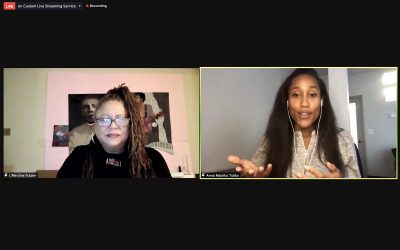Martin Luther King Jr., Malcolm X and James Baldwin were trailblazers of the civil rights movement. But are there changemakers America is forgetting?

A book by Anna Malaika Tubbs, an activist, educator and current Ph.D. candidate at the University of Cambridge, introduces three Black women who were crucial in shaping these leaders, but erased in history: their mothers.
Her book, “The Three Mothers: How the Mothers of Martin Luther King, Jr., Malcolm X, and James Baldwin Shaped a Nation,” highlights Alberta King, Louise Little and Berdis Baldwin: the women who raised the leaders. It was published Feb. 2 — at the beginning of Black History Month.
Tubbs joined the Boston Public Library for an hour-long virtual talk Tuesday to discuss the historical figures as part of the Central Library Author Talk Series. The event also is part of BPL’s Repairing America series — a 2021 focus on addressing divisive issues within the country, including racism and the politicization of public health crises.
In an interview, Tubbs said her debut work connects back to starting her Ph.D. She was inspired to “shatter” the erasure of Black women’s stories.
“We just reproduce these narratives where it was just these men who stood alone, as if they were these unicorn figures that … had no background or family behind them,” she said in an interview. “We reduce our history and Black history to only speak about them.”
Tubbs said she has seen the nature of erasure firsthand — media coverage of her husband Michael Tubbs, who was the mayor of Stockton, California from 2017 to 2021, consistently left herself and his mother out of the coverage — which inspired her work too.
“I realized people just take what mothers do, especially Black mothers, for granted,” Tubbs said, “and they don’t consider all the different factors that are in place that make it so difficult to accomplish these really incredible things for ourselves and for our children.”
L’Merchie Frazier, the director of education and interpretation at Boston’s Museum of African American History, moderated the BPL event. She said in an interview Tubbs’ personal connection to her subject comes across in her writing.
“That’s the majesty of her writing,” Frazier said. “Her writing is very infectious, and she is infectious in her personage. This is authentic.”
The event — held in partnership with the MAAH, American Ancestors by New England Historic Genealogical Society and the State Library of Massachusetts — featured discussions on why Tubbs chose her subjects, how she put the book together and what she thought about revolutionary movements built on one another.
Tubbs said in an interview learning about these women involved a lot of in-depth research, because many of their life details were difficult to ascertain from one source.
“Anytime you take on a project where you’re trying to correct erasure, it’s going to be difficult,” she said, “because their lives had been scattered, pieces of the puzzle that were all over the place.”
Tubbs began researching any time the three leaders had mentioned their mothers — whether written or verbal — and made a “master timeline of their lives” with Post-it Notes, posters and color coordination.
With the help of local historians from each woman’s hometown, she pieced together the rest of their history using birth certificates, death certificates, school papers and land deeds, bringing their stories to life.
Tubbs said she also worked with the women’s family members to understand what physical documentation can’t express: their spirit.
“It was crucial to me that people understand that whether these women had ever had these sons, they were already giving life in other ways,” Tubbs said in an interview. “They were activists, they were artists, they were writers, singers. There was so much that they were doing that was creative and giving new breath to their community members.”
Frazier said Tubbs’ book illustrates the true impact of these mothers on their sons, which made them the grand figures they would later become.
“The fact that she’s unearthed these women who are their mothers gives us an understanding of their support system,” she said, “that made them who they are.”
In the final chapter of her book — which Tubbs described as her “Black feminist manifesto” at the event — addresses action that needs to be taken today.
She said she hopes the book inspires people to fight the generational tragedy Black mothers face losing their children to violence and restructure the criminal “injustice” system to help prevent these deaths.
“Don’t only celebrate Alberta, Berdis, Louise and Mamie [Emmett Till’s mother] because of what they were able to endure,” she said. “Instead say ‘How do we fix the issues that are still in place that are creating circumstances that allow our children to die more often than others?’”
Tubbs added at the event she hopes people remember these women as changemakers and continue their fight forward.
“There’s so much left to do and so much work left to do,” she said, “but it’s tangible.”






















































































































